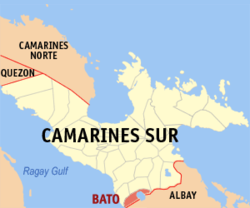This article needs additional citations for verification. (January 2013) |
Bato | |
|---|---|
| Municipality of Bato | |
 Municipal Hall | |
| Anthem: Bato, Banwaan na Ginikanan | |
 Map of Camarines Sur with Bato highlighted | |
Location within the Philippines | |
| Coordinates: 13°21′28″N 123°22′04″E / 13.3578°N 123.3678°E | |
| Country | Philippines |
| Region | Bicol Region |
| Province | Camarines Sur |
| District | 5th district |
| Barangays | 33 (see Barangays) |
| Government | |
| • Type | Sangguniang Bayan |
| • Mayor | Domingo L. Zorilla Jr |
| • Vice Mayor | Victorio S. Ramos |
| • Representative | Miguel Luis R. Villafuerte |
| • Municipal Council | Members |
| • Electorate | 33,077 voters (2022) |
| Area | |
• Total | 107.12 km2 (41.36 sq mi) |
| Elevation | 13 m (43 ft) |
| Highest elevation | 59 m (194 ft) |
| Lowest elevation | 4 m (13 ft) |
| Population (2020 census)[3] | |
• Total | 52,155 |
| • Density | 490/km2 (1,300/sq mi) |
| • Households | 10,782 |
| Economy | |
| • Income class | 3rd municipal income class |
| • Poverty incidence | 37.28 |
| • Revenue | ₱ 162.4 million (2020) |
| • Assets | ₱ 420.8 million (2020) |
| • Expenditure | ₱ 154.3 million (2020) |
| • Liabilities | ₱ 262.6 million (2020) |
| Service provider | |
| • Electricity | Camarines Sur 3 Electric Cooperative (CASURECO 3) |
| Time zone | UTC+8 (PST) |
| ZIP code | 4435 |
| PSGC | |
| IDD : area code | +63 (0)54 |
| Native languages | Rinconada Bikol Central Bikol Tagalog |
Bato, officially the Municipality of Bato (Rinconada Bikol: Banwāan ka Bato; Tagalog: Bayan ng Bato), is a 3rd class municipality in the province of Camarines Sur, Philippines. According to the 2020 census, it has a population of 52,155 people.[3]
The municipality of Bato is home to a lake teeming with various kinds of fishes. Sinarapan, the world's smallest commercially harvested fish, occupies the waters of Lake Bato. Also present, the lake abounds with tilapia housed in fish cages.
Bato is 26 kilometres (16 mi) from Pili and 476 kilometres (296 mi) from Manila.
- ^ Municipality of Bato | (DILG)
- ^ "2015 Census of Population, Report No. 3 – Population, Land Area, and Population Density" (PDF). Philippine Statistics Authority. Quezon City, Philippines. August 2016. ISSN 0117-1453. Archived (PDF) from the original on May 25, 2021. Retrieved July 16, 2021.
- ^ a b Census of Population (2020). "Region V (Bicol Region)". Total Population by Province, City, Municipality and Barangay. Philippine Statistics Authority. Retrieved 8 July 2021.
- ^ "PSA Releases the 2021 City and Municipal Level Poverty Estimates". Philippine Statistics Authority. 2 April 2024. Retrieved 28 April 2024.



